PESTEL Analysis, Risk, Opportunity, and EMS: Unilever Plc Report
VerifiedAdded on 2022/12/15
|16
|6022
|84
Report
AI Summary
This report provides a detailed PESTEL analysis of Unilever Plc, a UK-based consumer goods company operating globally. It explores the company's environment management system (EMS) and its significance in managing risks and opportunities. The analysis covers political, economic, social, technological, legal, and environmental factors affecting Unilever's operations. The report highlights environmental issues such as pollution, waste disposal, and climate change, and assesses how these factors influence the company's strategic decisions. It also examines the benefits and limitations of implementing an EMS, including waste reduction, regulatory compliance, and enhanced market image. The report further discusses the integration of legal requirements and barriers to EMS implementation, concluding with recommendations for improvement and future considerations. References are provided for further research and validation of the findings. The report aims to provide a comprehensive understanding of the business environment and strategic considerations for Unilever Plc.
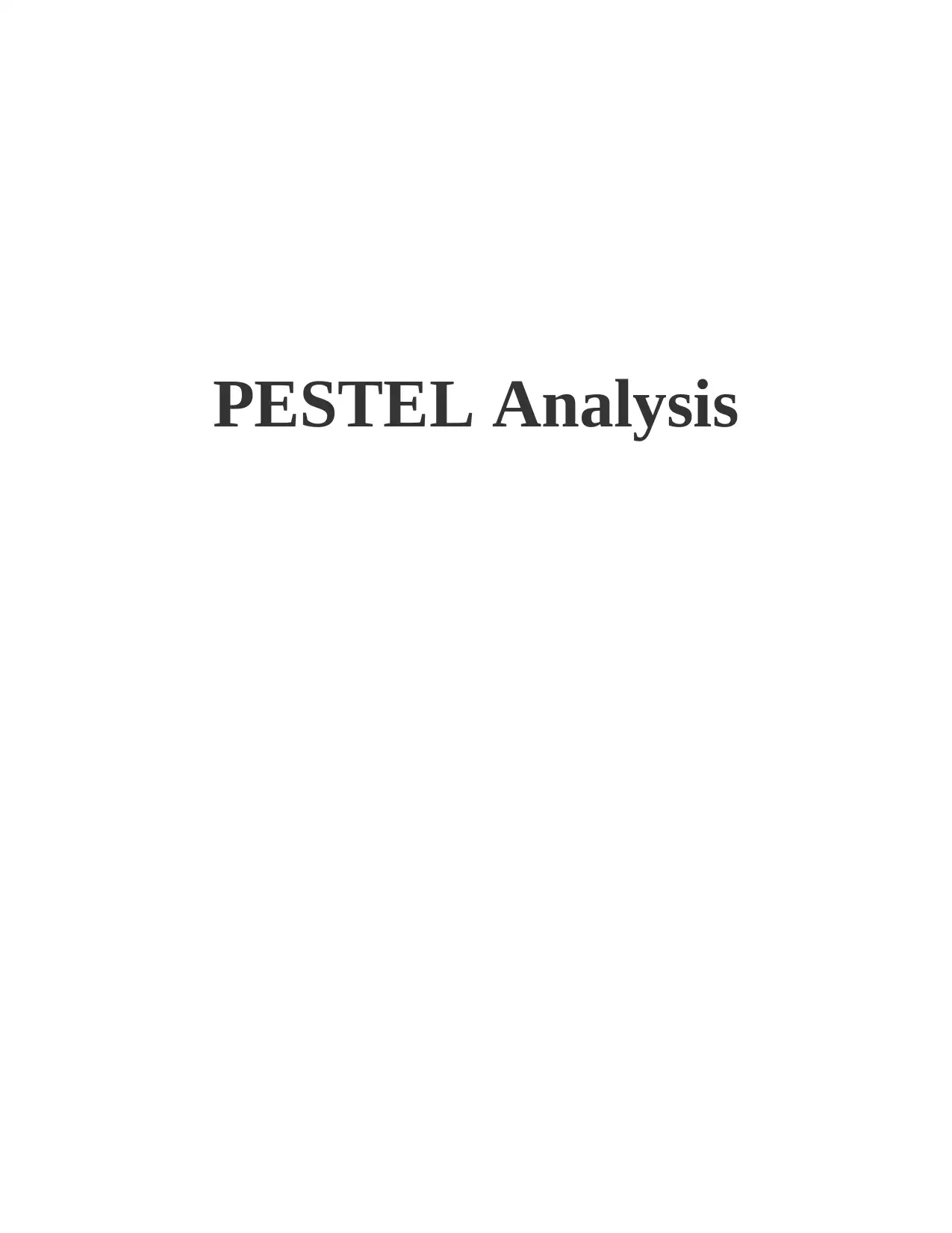
PESTEL Analysis
Paraphrase This Document
Need a fresh take? Get an instant paraphrase of this document with our AI Paraphraser
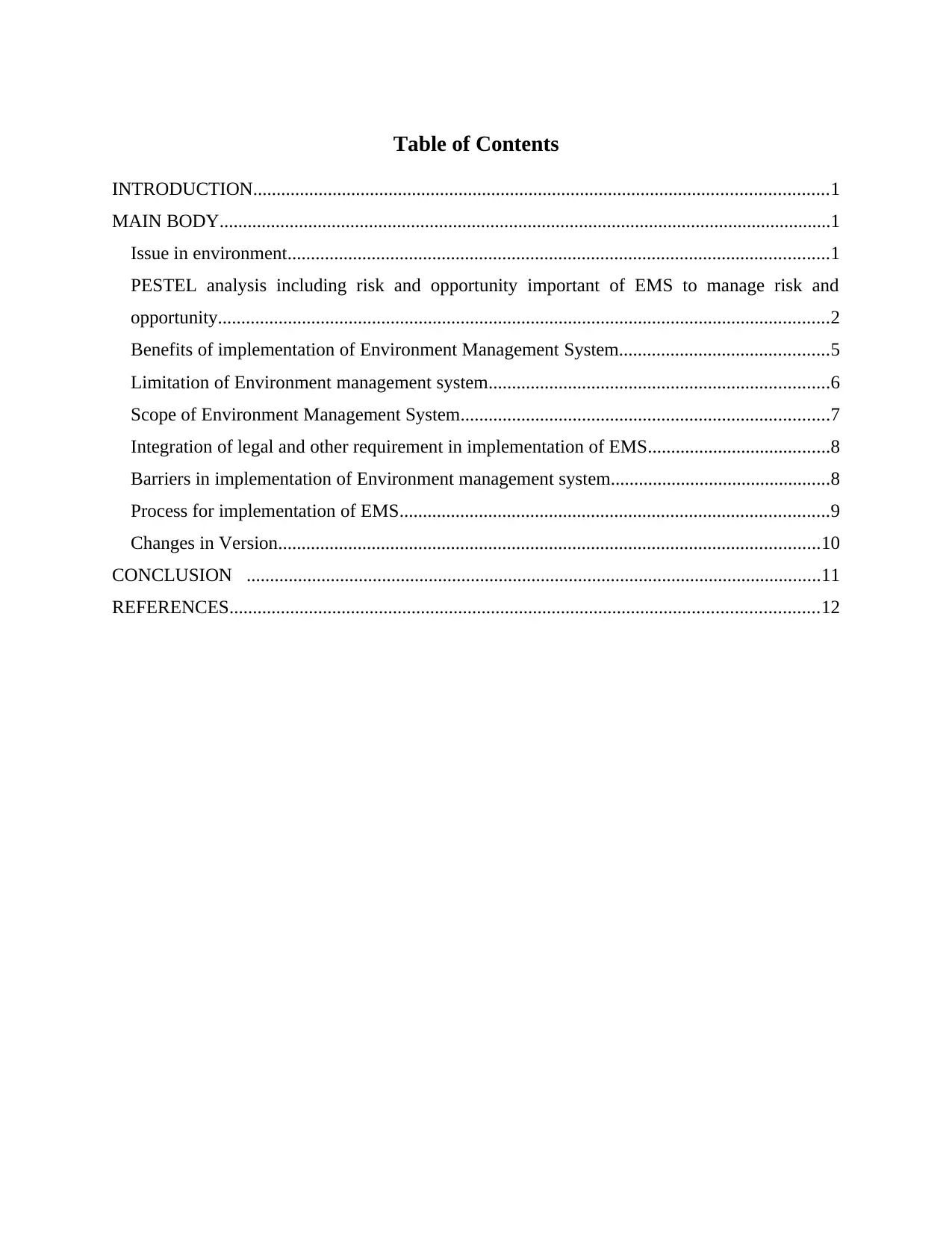
Table of Contents
INTRODUCTION...........................................................................................................................1
MAIN BODY...................................................................................................................................1
Issue in environment....................................................................................................................1
PESTEL analysis including risk and opportunity important of EMS to manage risk and
opportunity...................................................................................................................................2
Benefits of implementation of Environment Management System.............................................5
Limitation of Environment management system.........................................................................6
Scope of Environment Management System...............................................................................7
Integration of legal and other requirement in implementation of EMS.......................................8
Barriers in implementation of Environment management system...............................................8
Process for implementation of EMS............................................................................................9
Changes in Version....................................................................................................................10
CONCLUSION ...........................................................................................................................11
REFERENCES..............................................................................................................................12
INTRODUCTION...........................................................................................................................1
MAIN BODY...................................................................................................................................1
Issue in environment....................................................................................................................1
PESTEL analysis including risk and opportunity important of EMS to manage risk and
opportunity...................................................................................................................................2
Benefits of implementation of Environment Management System.............................................5
Limitation of Environment management system.........................................................................6
Scope of Environment Management System...............................................................................7
Integration of legal and other requirement in implementation of EMS.......................................8
Barriers in implementation of Environment management system...............................................8
Process for implementation of EMS............................................................................................9
Changes in Version....................................................................................................................10
CONCLUSION ...........................................................................................................................11
REFERENCES..............................................................................................................................12
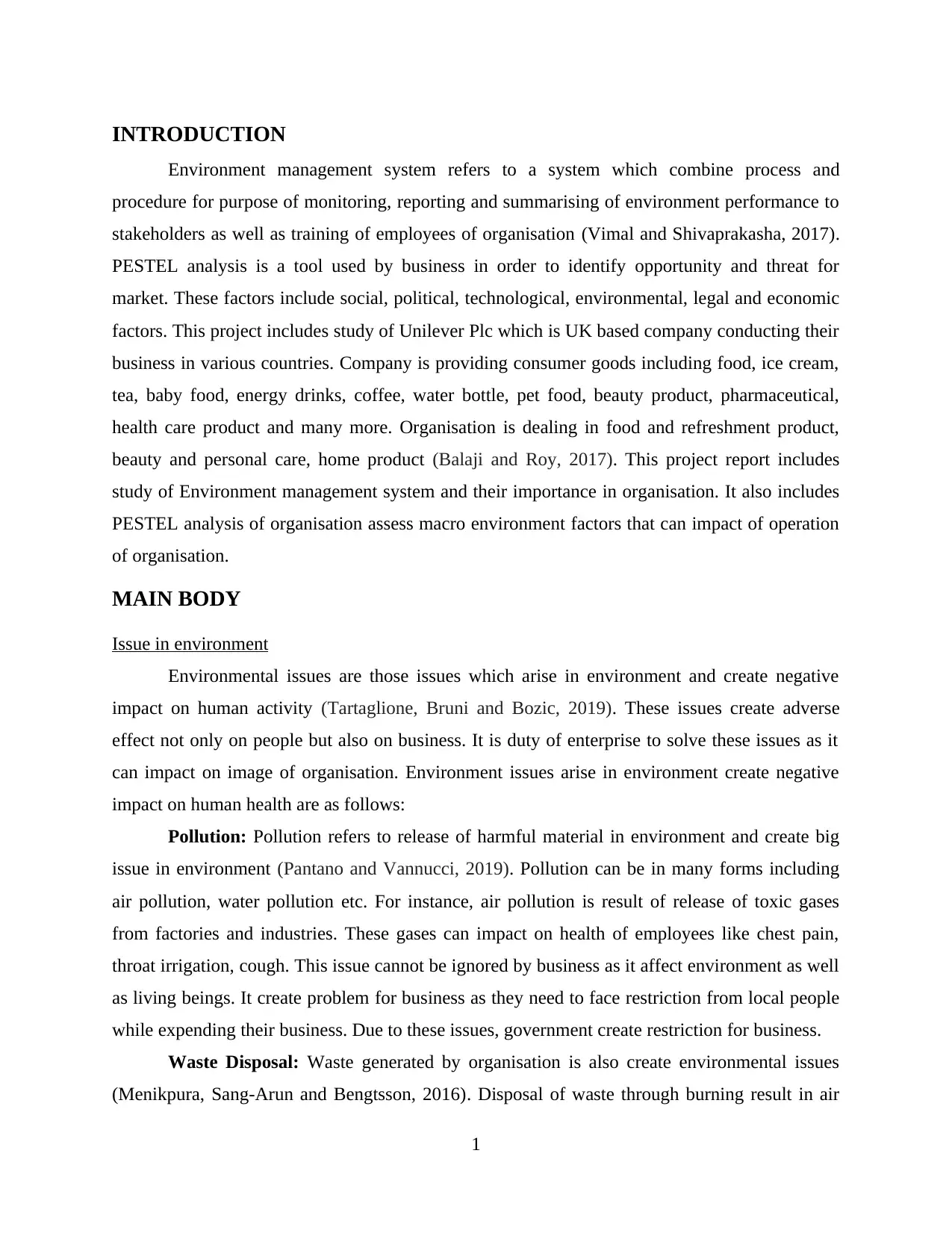
INTRODUCTION
Environment management system refers to a system which combine process and
procedure for purpose of monitoring, reporting and summarising of environment performance to
stakeholders as well as training of employees of organisation (Vimal and Shivaprakasha, 2017).
PESTEL analysis is a tool used by business in order to identify opportunity and threat for
market. These factors include social, political, technological, environmental, legal and economic
factors. This project includes study of Unilever Plc which is UK based company conducting their
business in various countries. Company is providing consumer goods including food, ice cream,
tea, baby food, energy drinks, coffee, water bottle, pet food, beauty product, pharmaceutical,
health care product and many more. Organisation is dealing in food and refreshment product,
beauty and personal care, home product (Balaji and Roy, 2017). This project report includes
study of Environment management system and their importance in organisation. It also includes
PESTEL analysis of organisation assess macro environment factors that can impact of operation
of organisation.
MAIN BODY
Issue in environment
Environmental issues are those issues which arise in environment and create negative
impact on human activity (Tartaglione, Bruni and Bozic, 2019). These issues create adverse
effect not only on people but also on business. It is duty of enterprise to solve these issues as it
can impact on image of organisation. Environment issues arise in environment create negative
impact on human health are as follows:
Pollution: Pollution refers to release of harmful material in environment and create big
issue in environment (Pantano and Vannucci, 2019). Pollution can be in many forms including
air pollution, water pollution etc. For instance, air pollution is result of release of toxic gases
from factories and industries. These gases can impact on health of employees like chest pain,
throat irrigation, cough. This issue cannot be ignored by business as it affect environment as well
as living beings. It create problem for business as they need to face restriction from local people
while expending their business. Due to these issues, government create restriction for business.
Waste Disposal: Waste generated by organisation is also create environmental issues
(Menikpura, Sang-Arun and Bengtsson, 2016). Disposal of waste through burning result in air
1
Environment management system refers to a system which combine process and
procedure for purpose of monitoring, reporting and summarising of environment performance to
stakeholders as well as training of employees of organisation (Vimal and Shivaprakasha, 2017).
PESTEL analysis is a tool used by business in order to identify opportunity and threat for
market. These factors include social, political, technological, environmental, legal and economic
factors. This project includes study of Unilever Plc which is UK based company conducting their
business in various countries. Company is providing consumer goods including food, ice cream,
tea, baby food, energy drinks, coffee, water bottle, pet food, beauty product, pharmaceutical,
health care product and many more. Organisation is dealing in food and refreshment product,
beauty and personal care, home product (Balaji and Roy, 2017). This project report includes
study of Environment management system and their importance in organisation. It also includes
PESTEL analysis of organisation assess macro environment factors that can impact of operation
of organisation.
MAIN BODY
Issue in environment
Environmental issues are those issues which arise in environment and create negative
impact on human activity (Tartaglione, Bruni and Bozic, 2019). These issues create adverse
effect not only on people but also on business. It is duty of enterprise to solve these issues as it
can impact on image of organisation. Environment issues arise in environment create negative
impact on human health are as follows:
Pollution: Pollution refers to release of harmful material in environment and create big
issue in environment (Pantano and Vannucci, 2019). Pollution can be in many forms including
air pollution, water pollution etc. For instance, air pollution is result of release of toxic gases
from factories and industries. These gases can impact on health of employees like chest pain,
throat irrigation, cough. This issue cannot be ignored by business as it affect environment as well
as living beings. It create problem for business as they need to face restriction from local people
while expending their business. Due to these issues, government create restriction for business.
Waste Disposal: Waste generated by organisation is also create environmental issues
(Menikpura, Sang-Arun and Bengtsson, 2016). Disposal of waste through burning result in air
1
⊘ This is a preview!⊘
Do you want full access?
Subscribe today to unlock all pages.

Trusted by 1+ million students worldwide
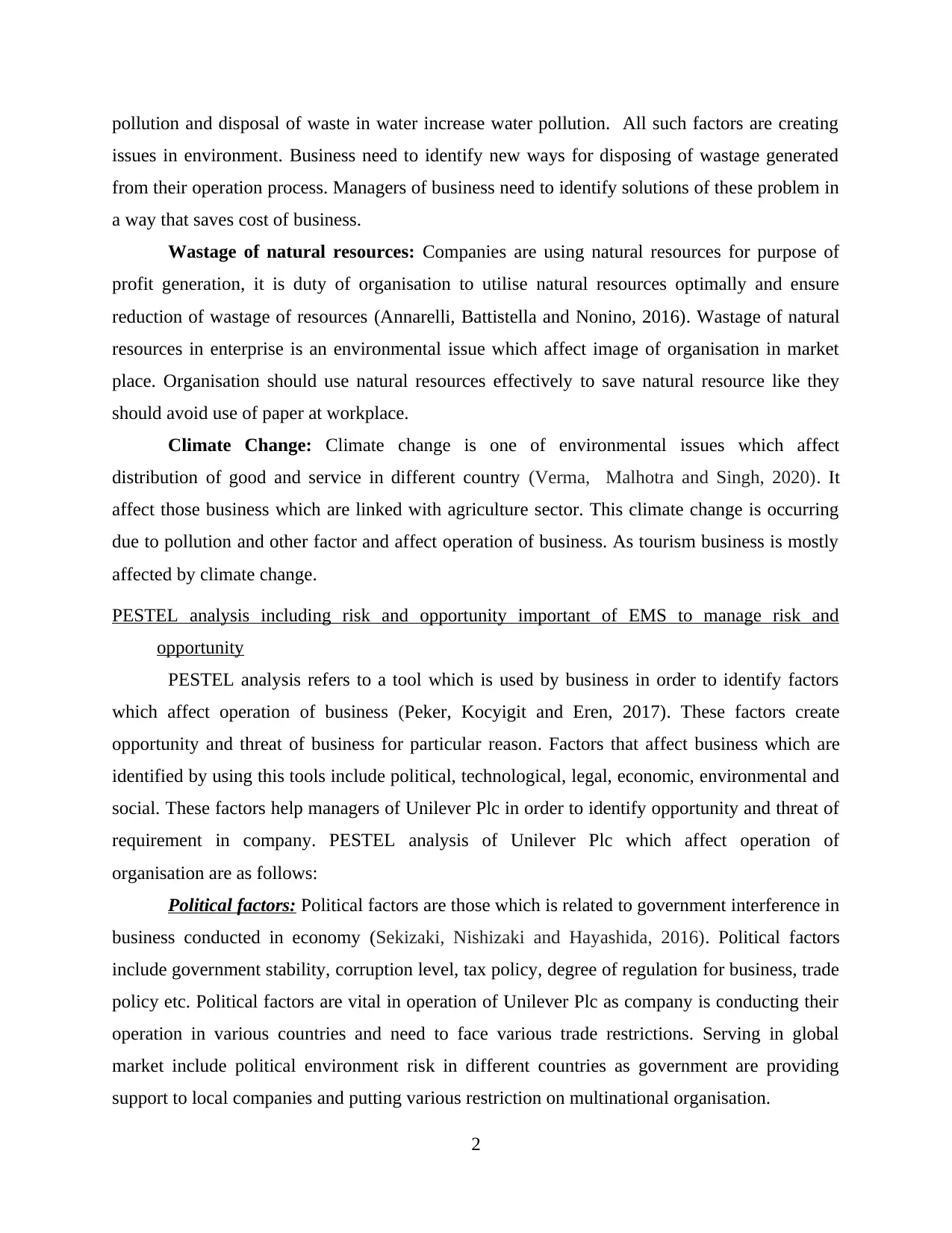
pollution and disposal of waste in water increase water pollution. All such factors are creating
issues in environment. Business need to identify new ways for disposing of wastage generated
from their operation process. Managers of business need to identify solutions of these problem in
a way that saves cost of business.
Wastage of natural resources: Companies are using natural resources for purpose of
profit generation, it is duty of organisation to utilise natural resources optimally and ensure
reduction of wastage of resources (Annarelli, Battistella and Nonino, 2016). Wastage of natural
resources in enterprise is an environmental issue which affect image of organisation in market
place. Organisation should use natural resources effectively to save natural resource like they
should avoid use of paper at workplace.
Climate Change: Climate change is one of environmental issues which affect
distribution of good and service in different country (Verma, Malhotra and Singh, 2020). It
affect those business which are linked with agriculture sector. This climate change is occurring
due to pollution and other factor and affect operation of business. As tourism business is mostly
affected by climate change.
PESTEL analysis including risk and opportunity important of EMS to manage risk and
opportunity
PESTEL analysis refers to a tool which is used by business in order to identify factors
which affect operation of business (Peker, Kocyigit and Eren, 2017). These factors create
opportunity and threat of business for particular reason. Factors that affect business which are
identified by using this tools include political, technological, legal, economic, environmental and
social. These factors help managers of Unilever Plc in order to identify opportunity and threat of
requirement in company. PESTEL analysis of Unilever Plc which affect operation of
organisation are as follows:
Political factors: Political factors are those which is related to government interference in
business conducted in economy (Sekizaki, Nishizaki and Hayashida, 2016). Political factors
include government stability, corruption level, tax policy, degree of regulation for business, trade
policy etc. Political factors are vital in operation of Unilever Plc as company is conducting their
operation in various countries and need to face various trade restrictions. Serving in global
market include political environment risk in different countries as government are providing
support to local companies and putting various restriction on multinational organisation.
2
issues in environment. Business need to identify new ways for disposing of wastage generated
from their operation process. Managers of business need to identify solutions of these problem in
a way that saves cost of business.
Wastage of natural resources: Companies are using natural resources for purpose of
profit generation, it is duty of organisation to utilise natural resources optimally and ensure
reduction of wastage of resources (Annarelli, Battistella and Nonino, 2016). Wastage of natural
resources in enterprise is an environmental issue which affect image of organisation in market
place. Organisation should use natural resources effectively to save natural resource like they
should avoid use of paper at workplace.
Climate Change: Climate change is one of environmental issues which affect
distribution of good and service in different country (Verma, Malhotra and Singh, 2020). It
affect those business which are linked with agriculture sector. This climate change is occurring
due to pollution and other factor and affect operation of business. As tourism business is mostly
affected by climate change.
PESTEL analysis including risk and opportunity important of EMS to manage risk and
opportunity
PESTEL analysis refers to a tool which is used by business in order to identify factors
which affect operation of business (Peker, Kocyigit and Eren, 2017). These factors create
opportunity and threat of business for particular reason. Factors that affect business which are
identified by using this tools include political, technological, legal, economic, environmental and
social. These factors help managers of Unilever Plc in order to identify opportunity and threat of
requirement in company. PESTEL analysis of Unilever Plc which affect operation of
organisation are as follows:
Political factors: Political factors are those which is related to government interference in
business conducted in economy (Sekizaki, Nishizaki and Hayashida, 2016). Political factors
include government stability, corruption level, tax policy, degree of regulation for business, trade
policy etc. Political factors are vital in operation of Unilever Plc as company is conducting their
operation in various countries and need to face various trade restrictions. Serving in global
market include political environment risk in different countries as government are providing
support to local companies and putting various restriction on multinational organisation.
2
Paraphrase This Document
Need a fresh take? Get an instant paraphrase of this document with our AI Paraphraser
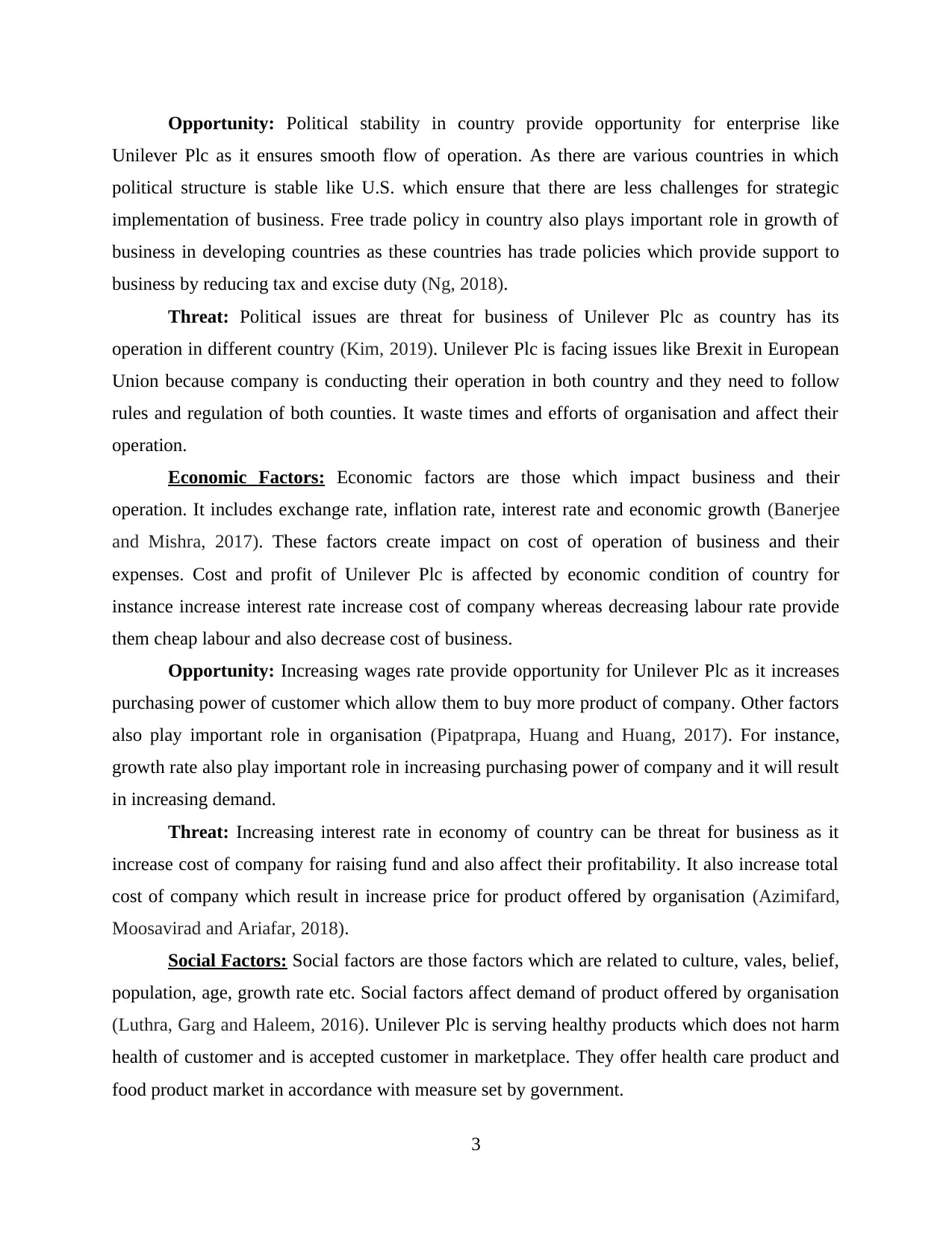
Opportunity: Political stability in country provide opportunity for enterprise like
Unilever Plc as it ensures smooth flow of operation. As there are various countries in which
political structure is stable like U.S. which ensure that there are less challenges for strategic
implementation of business. Free trade policy in country also plays important role in growth of
business in developing countries as these countries has trade policies which provide support to
business by reducing tax and excise duty (Ng, 2018).
Threat: Political issues are threat for business of Unilever Plc as country has its
operation in different country (Kim, 2019). Unilever Plc is facing issues like Brexit in European
Union because company is conducting their operation in both country and they need to follow
rules and regulation of both counties. It waste times and efforts of organisation and affect their
operation.
Economic Factors: Economic factors are those which impact business and their
operation. It includes exchange rate, inflation rate, interest rate and economic growth (Banerjee
and Mishra, 2017). These factors create impact on cost of operation of business and their
expenses. Cost and profit of Unilever Plc is affected by economic condition of country for
instance increase interest rate increase cost of company whereas decreasing labour rate provide
them cheap labour and also decrease cost of business.
Opportunity: Increasing wages rate provide opportunity for Unilever Plc as it increases
purchasing power of customer which allow them to buy more product of company. Other factors
also play important role in organisation (Pipatprapa, Huang and Huang, 2017). For instance,
growth rate also play important role in increasing purchasing power of company and it will result
in increasing demand.
Threat: Increasing interest rate in economy of country can be threat for business as it
increase cost of company for raising fund and also affect their profitability. It also increase total
cost of company which result in increase price for product offered by organisation (Azimifard,
Moosavirad and Ariafar, 2018).
Social Factors: Social factors are those factors which are related to culture, vales, belief,
population, age, growth rate etc. Social factors affect demand of product offered by organisation
(Luthra, Garg and Haleem, 2016). Unilever Plc is serving healthy products which does not harm
health of customer and is accepted customer in marketplace. They offer health care product and
food product market in accordance with measure set by government.
3
Unilever Plc as it ensures smooth flow of operation. As there are various countries in which
political structure is stable like U.S. which ensure that there are less challenges for strategic
implementation of business. Free trade policy in country also plays important role in growth of
business in developing countries as these countries has trade policies which provide support to
business by reducing tax and excise duty (Ng, 2018).
Threat: Political issues are threat for business of Unilever Plc as country has its
operation in different country (Kim, 2019). Unilever Plc is facing issues like Brexit in European
Union because company is conducting their operation in both country and they need to follow
rules and regulation of both counties. It waste times and efforts of organisation and affect their
operation.
Economic Factors: Economic factors are those which impact business and their
operation. It includes exchange rate, inflation rate, interest rate and economic growth (Banerjee
and Mishra, 2017). These factors create impact on cost of operation of business and their
expenses. Cost and profit of Unilever Plc is affected by economic condition of country for
instance increase interest rate increase cost of company whereas decreasing labour rate provide
them cheap labour and also decrease cost of business.
Opportunity: Increasing wages rate provide opportunity for Unilever Plc as it increases
purchasing power of customer which allow them to buy more product of company. Other factors
also play important role in organisation (Pipatprapa, Huang and Huang, 2017). For instance,
growth rate also play important role in increasing purchasing power of company and it will result
in increasing demand.
Threat: Increasing interest rate in economy of country can be threat for business as it
increase cost of company for raising fund and also affect their profitability. It also increase total
cost of company which result in increase price for product offered by organisation (Azimifard,
Moosavirad and Ariafar, 2018).
Social Factors: Social factors are those factors which are related to culture, vales, belief,
population, age, growth rate etc. Social factors affect demand of product offered by organisation
(Luthra, Garg and Haleem, 2016). Unilever Plc is serving healthy products which does not harm
health of customer and is accepted customer in marketplace. They offer health care product and
food product market in accordance with measure set by government.
3
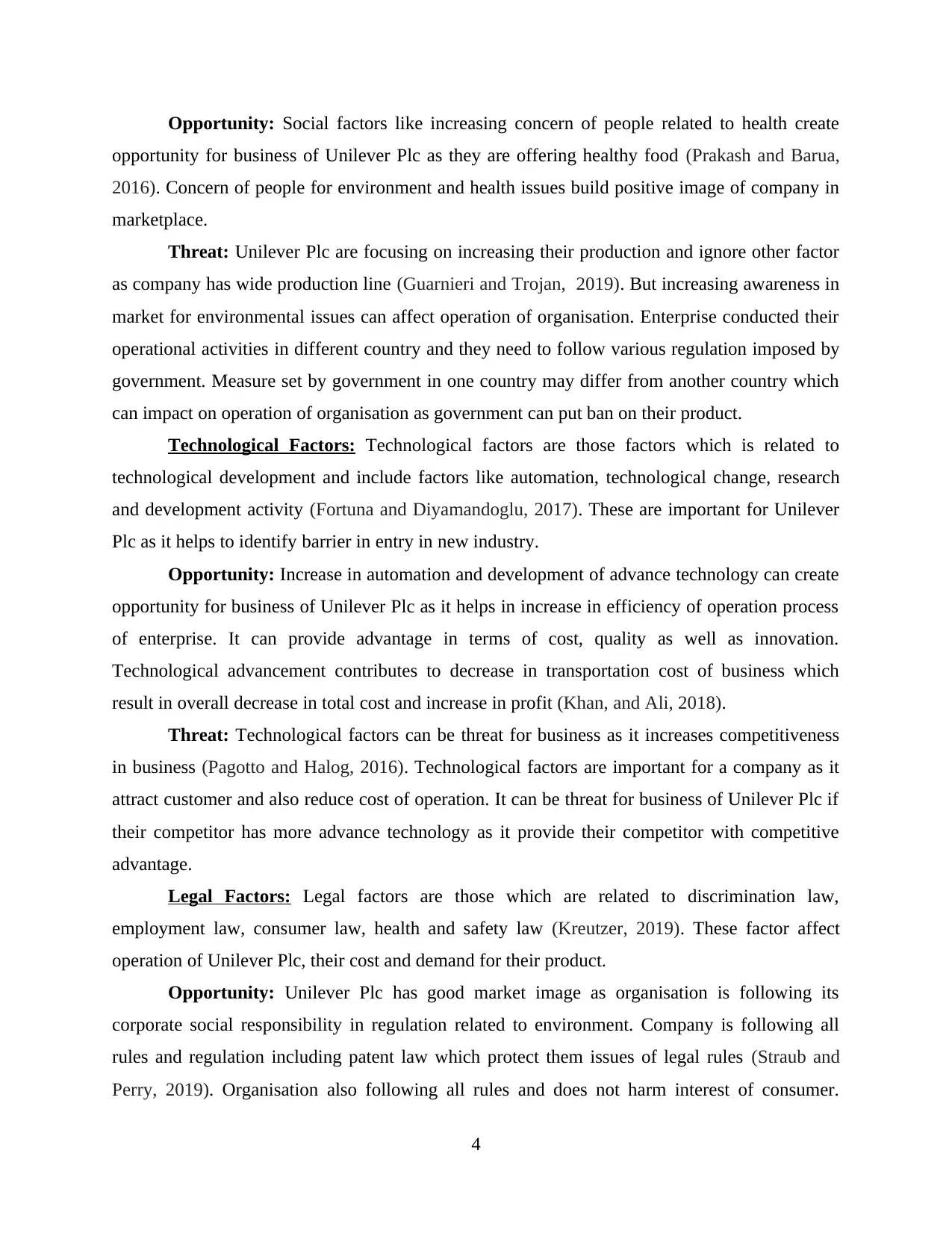
Opportunity: Social factors like increasing concern of people related to health create
opportunity for business of Unilever Plc as they are offering healthy food (Prakash and Barua,
2016). Concern of people for environment and health issues build positive image of company in
marketplace.
Threat: Unilever Plc are focusing on increasing their production and ignore other factor
as company has wide production line (Guarnieri and Trojan, 2019). But increasing awareness in
market for environmental issues can affect operation of organisation. Enterprise conducted their
operational activities in different country and they need to follow various regulation imposed by
government. Measure set by government in one country may differ from another country which
can impact on operation of organisation as government can put ban on their product.
Technological Factors: Technological factors are those factors which is related to
technological development and include factors like automation, technological change, research
and development activity (Fortuna and Diyamandoglu, 2017). These are important for Unilever
Plc as it helps to identify barrier in entry in new industry.
Opportunity: Increase in automation and development of advance technology can create
opportunity for business of Unilever Plc as it helps in increase in efficiency of operation process
of enterprise. It can provide advantage in terms of cost, quality as well as innovation.
Technological advancement contributes to decrease in transportation cost of business which
result in overall decrease in total cost and increase in profit (Khan, and Ali, 2018).
Threat: Technological factors can be threat for business as it increases competitiveness
in business (Pagotto and Halog, 2016). Technological factors are important for a company as it
attract customer and also reduce cost of operation. It can be threat for business of Unilever Plc if
their competitor has more advance technology as it provide their competitor with competitive
advantage.
Legal Factors: Legal factors are those which are related to discrimination law,
employment law, consumer law, health and safety law (Kreutzer, 2019). These factor affect
operation of Unilever Plc, their cost and demand for their product.
Opportunity: Unilever Plc has good market image as organisation is following its
corporate social responsibility in regulation related to environment. Company is following all
rules and regulation including patent law which protect them issues of legal rules (Straub and
Perry, 2019). Organisation also following all rules and does not harm interest of consumer.
4
opportunity for business of Unilever Plc as they are offering healthy food (Prakash and Barua,
2016). Concern of people for environment and health issues build positive image of company in
marketplace.
Threat: Unilever Plc are focusing on increasing their production and ignore other factor
as company has wide production line (Guarnieri and Trojan, 2019). But increasing awareness in
market for environmental issues can affect operation of organisation. Enterprise conducted their
operational activities in different country and they need to follow various regulation imposed by
government. Measure set by government in one country may differ from another country which
can impact on operation of organisation as government can put ban on their product.
Technological Factors: Technological factors are those factors which is related to
technological development and include factors like automation, technological change, research
and development activity (Fortuna and Diyamandoglu, 2017). These are important for Unilever
Plc as it helps to identify barrier in entry in new industry.
Opportunity: Increase in automation and development of advance technology can create
opportunity for business of Unilever Plc as it helps in increase in efficiency of operation process
of enterprise. It can provide advantage in terms of cost, quality as well as innovation.
Technological advancement contributes to decrease in transportation cost of business which
result in overall decrease in total cost and increase in profit (Khan, and Ali, 2018).
Threat: Technological factors can be threat for business as it increases competitiveness
in business (Pagotto and Halog, 2016). Technological factors are important for a company as it
attract customer and also reduce cost of operation. It can be threat for business of Unilever Plc if
their competitor has more advance technology as it provide their competitor with competitive
advantage.
Legal Factors: Legal factors are those which are related to discrimination law,
employment law, consumer law, health and safety law (Kreutzer, 2019). These factor affect
operation of Unilever Plc, their cost and demand for their product.
Opportunity: Unilever Plc has good market image as organisation is following its
corporate social responsibility in regulation related to environment. Company is following all
rules and regulation including patent law which protect them issues of legal rules (Straub and
Perry, 2019). Organisation also following all rules and does not harm interest of consumer.
4
⊘ This is a preview!⊘
Do you want full access?
Subscribe today to unlock all pages.

Trusted by 1+ million students worldwide
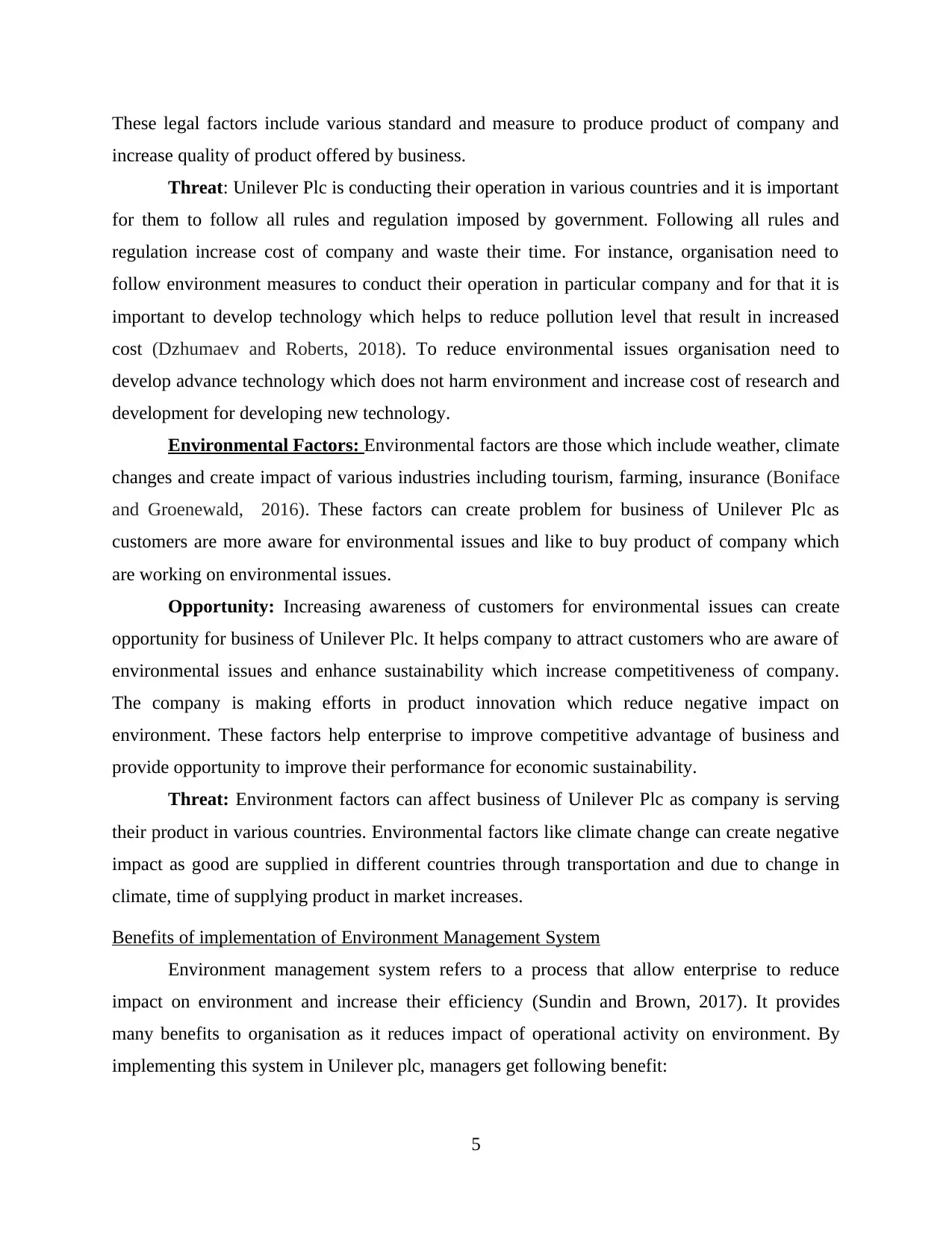
These legal factors include various standard and measure to produce product of company and
increase quality of product offered by business.
Threat: Unilever Plc is conducting their operation in various countries and it is important
for them to follow all rules and regulation imposed by government. Following all rules and
regulation increase cost of company and waste their time. For instance, organisation need to
follow environment measures to conduct their operation in particular company and for that it is
important to develop technology which helps to reduce pollution level that result in increased
cost (Dzhumaev and Roberts, 2018). To reduce environmental issues organisation need to
develop advance technology which does not harm environment and increase cost of research and
development for developing new technology.
Environmental Factors: Environmental factors are those which include weather, climate
changes and create impact of various industries including tourism, farming, insurance (Boniface
and Groenewald, 2016). These factors can create problem for business of Unilever Plc as
customers are more aware for environmental issues and like to buy product of company which
are working on environmental issues.
Opportunity: Increasing awareness of customers for environmental issues can create
opportunity for business of Unilever Plc. It helps company to attract customers who are aware of
environmental issues and enhance sustainability which increase competitiveness of company.
The company is making efforts in product innovation which reduce negative impact on
environment. These factors help enterprise to improve competitive advantage of business and
provide opportunity to improve their performance for economic sustainability.
Threat: Environment factors can affect business of Unilever Plc as company is serving
their product in various countries. Environmental factors like climate change can create negative
impact as good are supplied in different countries through transportation and due to change in
climate, time of supplying product in market increases.
Benefits of implementation of Environment Management System
Environment management system refers to a process that allow enterprise to reduce
impact on environment and increase their efficiency (Sundin and Brown, 2017). It provides
many benefits to organisation as it reduces impact of operational activity on environment. By
implementing this system in Unilever plc, managers get following benefit:
5
increase quality of product offered by business.
Threat: Unilever Plc is conducting their operation in various countries and it is important
for them to follow all rules and regulation imposed by government. Following all rules and
regulation increase cost of company and waste their time. For instance, organisation need to
follow environment measures to conduct their operation in particular company and for that it is
important to develop technology which helps to reduce pollution level that result in increased
cost (Dzhumaev and Roberts, 2018). To reduce environmental issues organisation need to
develop advance technology which does not harm environment and increase cost of research and
development for developing new technology.
Environmental Factors: Environmental factors are those which include weather, climate
changes and create impact of various industries including tourism, farming, insurance (Boniface
and Groenewald, 2016). These factors can create problem for business of Unilever Plc as
customers are more aware for environmental issues and like to buy product of company which
are working on environmental issues.
Opportunity: Increasing awareness of customers for environmental issues can create
opportunity for business of Unilever Plc. It helps company to attract customers who are aware of
environmental issues and enhance sustainability which increase competitiveness of company.
The company is making efforts in product innovation which reduce negative impact on
environment. These factors help enterprise to improve competitive advantage of business and
provide opportunity to improve their performance for economic sustainability.
Threat: Environment factors can affect business of Unilever Plc as company is serving
their product in various countries. Environmental factors like climate change can create negative
impact as good are supplied in different countries through transportation and due to change in
climate, time of supplying product in market increases.
Benefits of implementation of Environment Management System
Environment management system refers to a process that allow enterprise to reduce
impact on environment and increase their efficiency (Sundin and Brown, 2017). It provides
many benefits to organisation as it reduces impact of operational activity on environment. By
implementing this system in Unilever plc, managers get following benefit:
5
Paraphrase This Document
Need a fresh take? Get an instant paraphrase of this document with our AI Paraphraser
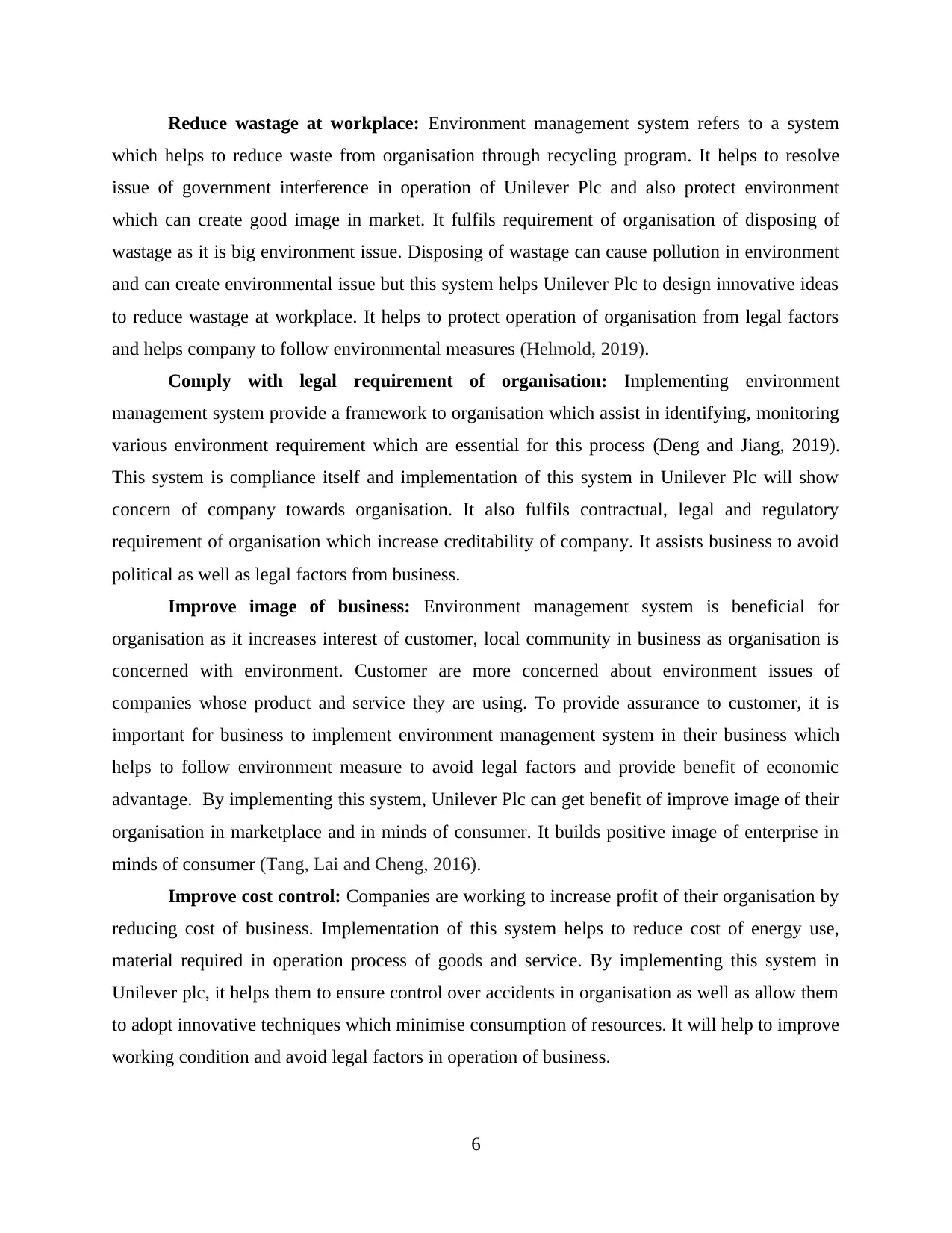
Reduce wastage at workplace: Environment management system refers to a system
which helps to reduce waste from organisation through recycling program. It helps to resolve
issue of government interference in operation of Unilever Plc and also protect environment
which can create good image in market. It fulfils requirement of organisation of disposing of
wastage as it is big environment issue. Disposing of wastage can cause pollution in environment
and can create environmental issue but this system helps Unilever Plc to design innovative ideas
to reduce wastage at workplace. It helps to protect operation of organisation from legal factors
and helps company to follow environmental measures (Helmold, 2019).
Comply with legal requirement of organisation: Implementing environment
management system provide a framework to organisation which assist in identifying, monitoring
various environment requirement which are essential for this process (Deng and Jiang, 2019).
This system is compliance itself and implementation of this system in Unilever Plc will show
concern of company towards organisation. It also fulfils contractual, legal and regulatory
requirement of organisation which increase creditability of company. It assists business to avoid
political as well as legal factors from business.
Improve image of business: Environment management system is beneficial for
organisation as it increases interest of customer, local community in business as organisation is
concerned with environment. Customer are more concerned about environment issues of
companies whose product and service they are using. To provide assurance to customer, it is
important for business to implement environment management system in their business which
helps to follow environment measure to avoid legal factors and provide benefit of economic
advantage. By implementing this system, Unilever Plc can get benefit of improve image of their
organisation in marketplace and in minds of consumer. It builds positive image of enterprise in
minds of consumer (Tang, Lai and Cheng, 2016).
Improve cost control: Companies are working to increase profit of their organisation by
reducing cost of business. Implementation of this system helps to reduce cost of energy use,
material required in operation process of goods and service. By implementing this system in
Unilever plc, it helps them to ensure control over accidents in organisation as well as allow them
to adopt innovative techniques which minimise consumption of resources. It will help to improve
working condition and avoid legal factors in operation of business.
6
which helps to reduce waste from organisation through recycling program. It helps to resolve
issue of government interference in operation of Unilever Plc and also protect environment
which can create good image in market. It fulfils requirement of organisation of disposing of
wastage as it is big environment issue. Disposing of wastage can cause pollution in environment
and can create environmental issue but this system helps Unilever Plc to design innovative ideas
to reduce wastage at workplace. It helps to protect operation of organisation from legal factors
and helps company to follow environmental measures (Helmold, 2019).
Comply with legal requirement of organisation: Implementing environment
management system provide a framework to organisation which assist in identifying, monitoring
various environment requirement which are essential for this process (Deng and Jiang, 2019).
This system is compliance itself and implementation of this system in Unilever Plc will show
concern of company towards organisation. It also fulfils contractual, legal and regulatory
requirement of organisation which increase creditability of company. It assists business to avoid
political as well as legal factors from business.
Improve image of business: Environment management system is beneficial for
organisation as it increases interest of customer, local community in business as organisation is
concerned with environment. Customer are more concerned about environment issues of
companies whose product and service they are using. To provide assurance to customer, it is
important for business to implement environment management system in their business which
helps to follow environment measure to avoid legal factors and provide benefit of economic
advantage. By implementing this system, Unilever Plc can get benefit of improve image of their
organisation in marketplace and in minds of consumer. It builds positive image of enterprise in
minds of consumer (Tang, Lai and Cheng, 2016).
Improve cost control: Companies are working to increase profit of their organisation by
reducing cost of business. Implementation of this system helps to reduce cost of energy use,
material required in operation process of goods and service. By implementing this system in
Unilever plc, it helps them to ensure control over accidents in organisation as well as allow them
to adopt innovative techniques which minimise consumption of resources. It will help to improve
working condition and avoid legal factors in operation of business.
6
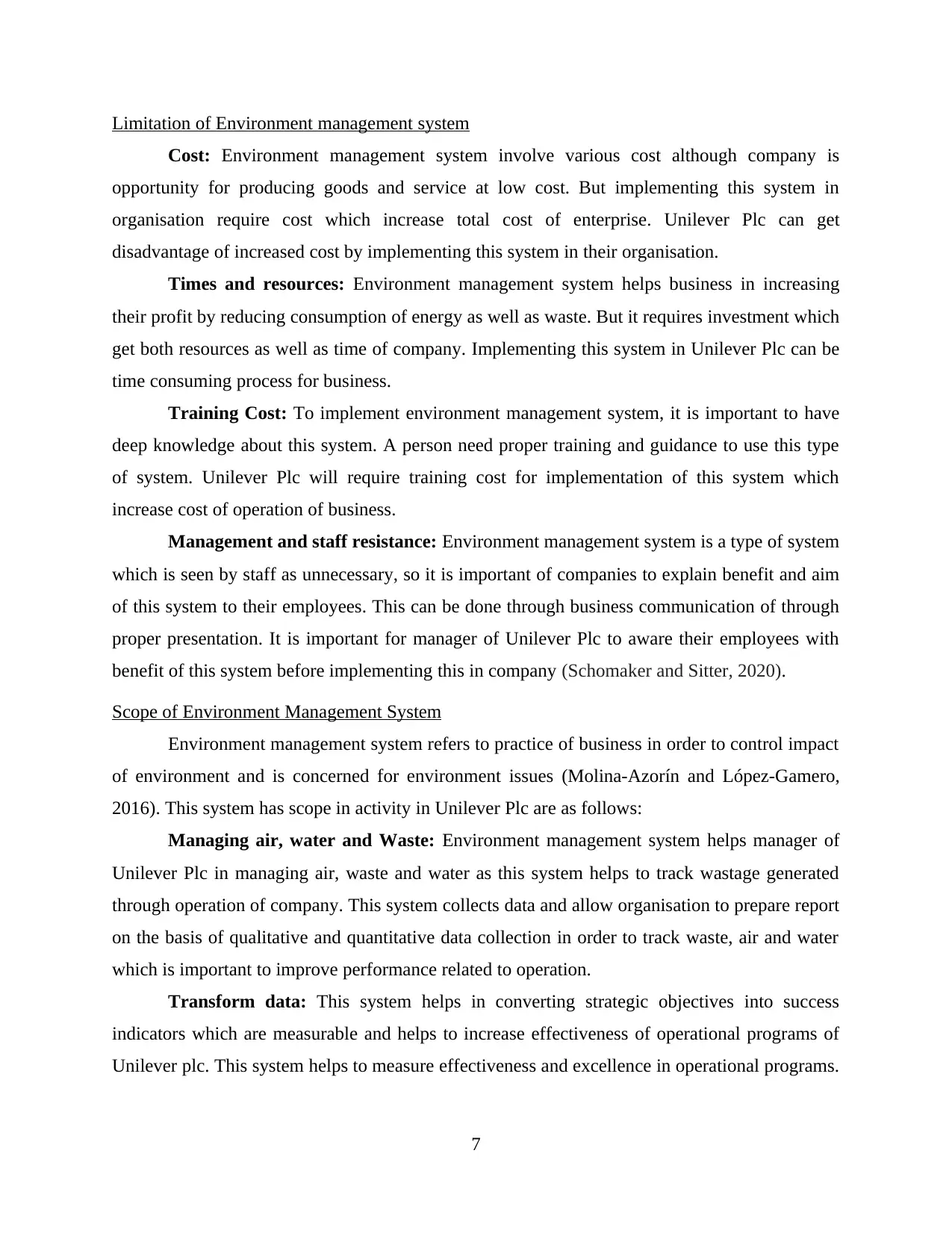
Limitation of Environment management system
Cost: Environment management system involve various cost although company is
opportunity for producing goods and service at low cost. But implementing this system in
organisation require cost which increase total cost of enterprise. Unilever Plc can get
disadvantage of increased cost by implementing this system in their organisation.
Times and resources: Environment management system helps business in increasing
their profit by reducing consumption of energy as well as waste. But it requires investment which
get both resources as well as time of company. Implementing this system in Unilever Plc can be
time consuming process for business.
Training Cost: To implement environment management system, it is important to have
deep knowledge about this system. A person need proper training and guidance to use this type
of system. Unilever Plc will require training cost for implementation of this system which
increase cost of operation of business.
Management and staff resistance: Environment management system is a type of system
which is seen by staff as unnecessary, so it is important of companies to explain benefit and aim
of this system to their employees. This can be done through business communication of through
proper presentation. It is important for manager of Unilever Plc to aware their employees with
benefit of this system before implementing this in company (Schomaker and Sitter, 2020).
Scope of Environment Management System
Environment management system refers to practice of business in order to control impact
of environment and is concerned for environment issues (Molina‐Azorín and López‐Gamero,
2016). This system has scope in activity in Unilever Plc are as follows:
Managing air, water and Waste: Environment management system helps manager of
Unilever Plc in managing air, waste and water as this system helps to track wastage generated
through operation of company. This system collects data and allow organisation to prepare report
on the basis of qualitative and quantitative data collection in order to track waste, air and water
which is important to improve performance related to operation.
Transform data: This system helps in converting strategic objectives into success
indicators which are measurable and helps to increase effectiveness of operational programs of
Unilever plc. This system helps to measure effectiveness and excellence in operational programs.
7
Cost: Environment management system involve various cost although company is
opportunity for producing goods and service at low cost. But implementing this system in
organisation require cost which increase total cost of enterprise. Unilever Plc can get
disadvantage of increased cost by implementing this system in their organisation.
Times and resources: Environment management system helps business in increasing
their profit by reducing consumption of energy as well as waste. But it requires investment which
get both resources as well as time of company. Implementing this system in Unilever Plc can be
time consuming process for business.
Training Cost: To implement environment management system, it is important to have
deep knowledge about this system. A person need proper training and guidance to use this type
of system. Unilever Plc will require training cost for implementation of this system which
increase cost of operation of business.
Management and staff resistance: Environment management system is a type of system
which is seen by staff as unnecessary, so it is important of companies to explain benefit and aim
of this system to their employees. This can be done through business communication of through
proper presentation. It is important for manager of Unilever Plc to aware their employees with
benefit of this system before implementing this in company (Schomaker and Sitter, 2020).
Scope of Environment Management System
Environment management system refers to practice of business in order to control impact
of environment and is concerned for environment issues (Molina‐Azorín and López‐Gamero,
2016). This system has scope in activity in Unilever Plc are as follows:
Managing air, water and Waste: Environment management system helps manager of
Unilever Plc in managing air, waste and water as this system helps to track wastage generated
through operation of company. This system collects data and allow organisation to prepare report
on the basis of qualitative and quantitative data collection in order to track waste, air and water
which is important to improve performance related to operation.
Transform data: This system helps in converting strategic objectives into success
indicators which are measurable and helps to increase effectiveness of operational programs of
Unilever plc. This system helps to measure effectiveness and excellence in operational programs.
7
⊘ This is a preview!⊘
Do you want full access?
Subscribe today to unlock all pages.

Trusted by 1+ million students worldwide
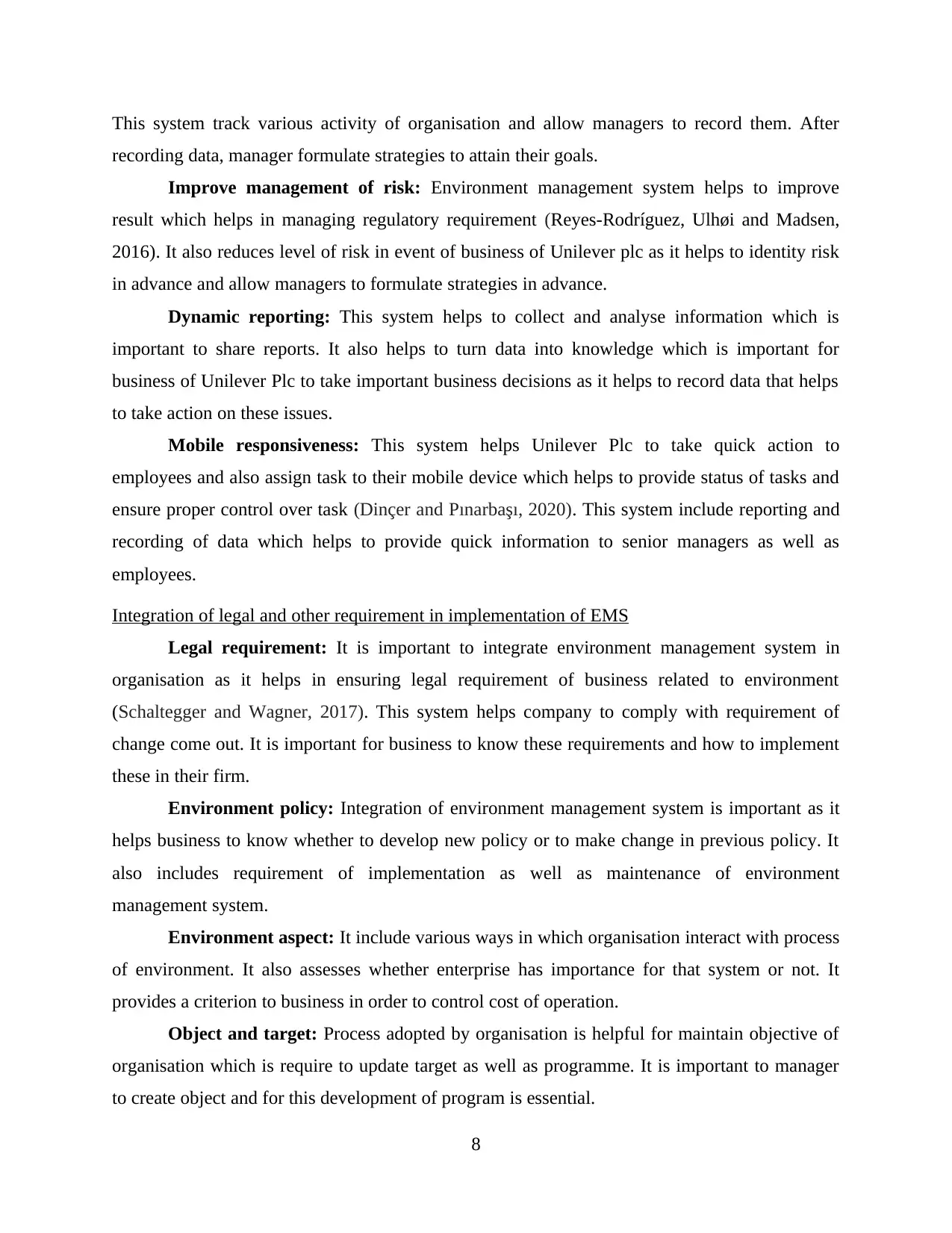
This system track various activity of organisation and allow managers to record them. After
recording data, manager formulate strategies to attain their goals.
Improve management of risk: Environment management system helps to improve
result which helps in managing regulatory requirement (Reyes‐Rodríguez, Ulhøi and Madsen,
2016). It also reduces level of risk in event of business of Unilever plc as it helps to identity risk
in advance and allow managers to formulate strategies in advance.
Dynamic reporting: This system helps to collect and analyse information which is
important to share reports. It also helps to turn data into knowledge which is important for
business of Unilever Plc to take important business decisions as it helps to record data that helps
to take action on these issues.
Mobile responsiveness: This system helps Unilever Plc to take quick action to
employees and also assign task to their mobile device which helps to provide status of tasks and
ensure proper control over task (Dinçer and Pınarbaşı, 2020). This system include reporting and
recording of data which helps to provide quick information to senior managers as well as
employees.
Integration of legal and other requirement in implementation of EMS
Legal requirement: It is important to integrate environment management system in
organisation as it helps in ensuring legal requirement of business related to environment
(Schaltegger and Wagner, 2017). This system helps company to comply with requirement of
change come out. It is important for business to know these requirements and how to implement
these in their firm.
Environment policy: Integration of environment management system is important as it
helps business to know whether to develop new policy or to make change in previous policy. It
also includes requirement of implementation as well as maintenance of environment
management system.
Environment aspect: It include various ways in which organisation interact with process
of environment. It also assesses whether enterprise has importance for that system or not. It
provides a criterion to business in order to control cost of operation.
Object and target: Process adopted by organisation is helpful for maintain objective of
organisation which is require to update target as well as programme. It is important to manager
to create object and for this development of program is essential.
8
recording data, manager formulate strategies to attain their goals.
Improve management of risk: Environment management system helps to improve
result which helps in managing regulatory requirement (Reyes‐Rodríguez, Ulhøi and Madsen,
2016). It also reduces level of risk in event of business of Unilever plc as it helps to identity risk
in advance and allow managers to formulate strategies in advance.
Dynamic reporting: This system helps to collect and analyse information which is
important to share reports. It also helps to turn data into knowledge which is important for
business of Unilever Plc to take important business decisions as it helps to record data that helps
to take action on these issues.
Mobile responsiveness: This system helps Unilever Plc to take quick action to
employees and also assign task to their mobile device which helps to provide status of tasks and
ensure proper control over task (Dinçer and Pınarbaşı, 2020). This system include reporting and
recording of data which helps to provide quick information to senior managers as well as
employees.
Integration of legal and other requirement in implementation of EMS
Legal requirement: It is important to integrate environment management system in
organisation as it helps in ensuring legal requirement of business related to environment
(Schaltegger and Wagner, 2017). This system helps company to comply with requirement of
change come out. It is important for business to know these requirements and how to implement
these in their firm.
Environment policy: Integration of environment management system is important as it
helps business to know whether to develop new policy or to make change in previous policy. It
also includes requirement of implementation as well as maintenance of environment
management system.
Environment aspect: It include various ways in which organisation interact with process
of environment. It also assesses whether enterprise has importance for that system or not. It
provides a criterion to business in order to control cost of operation.
Object and target: Process adopted by organisation is helpful for maintain objective of
organisation which is require to update target as well as programme. It is important to manager
to create object and for this development of program is essential.
8
Paraphrase This Document
Need a fresh take? Get an instant paraphrase of this document with our AI Paraphraser
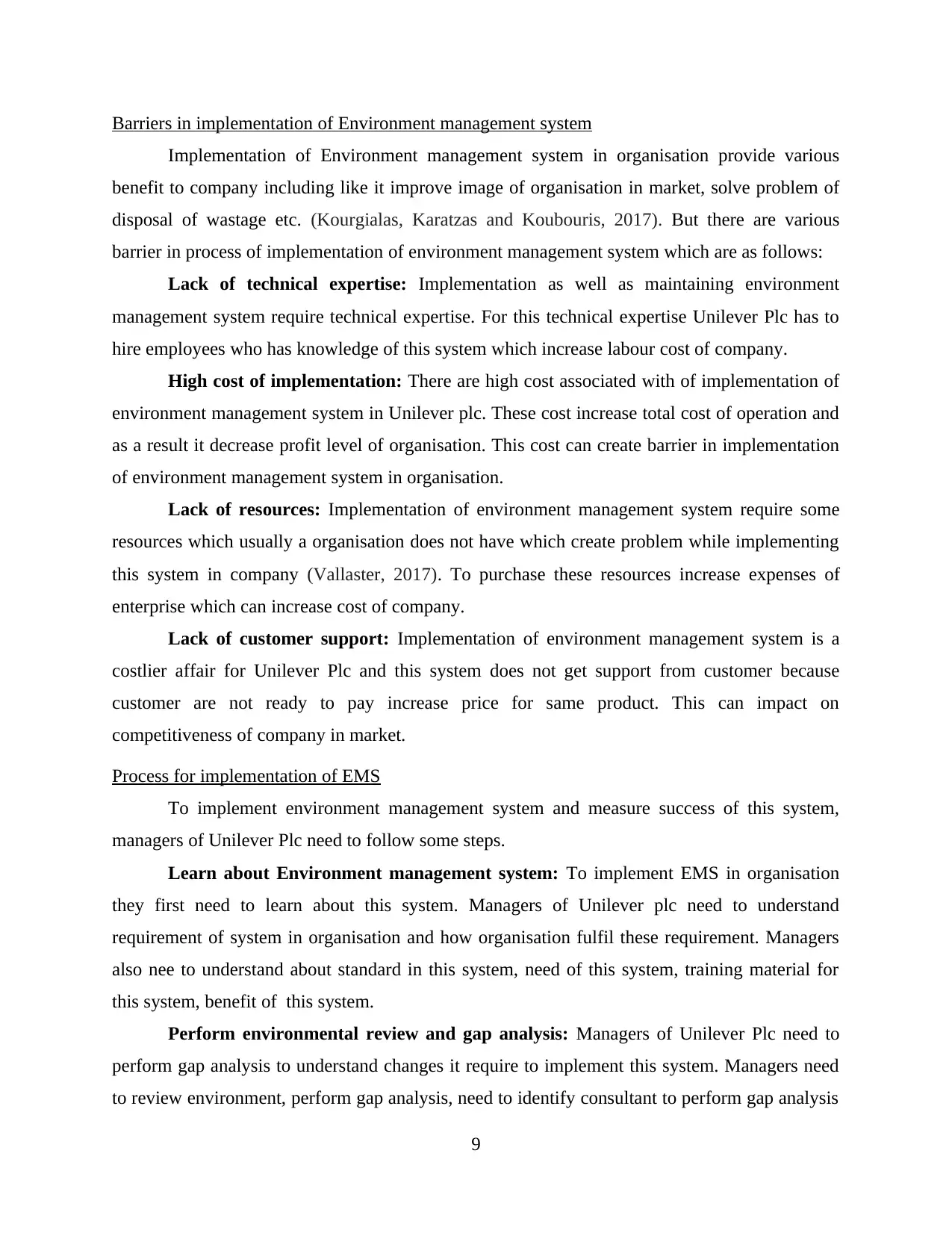
Barriers in implementation of Environment management system
Implementation of Environment management system in organisation provide various
benefit to company including like it improve image of organisation in market, solve problem of
disposal of wastage etc. (Kourgialas, Karatzas and Koubouris, 2017). But there are various
barrier in process of implementation of environment management system which are as follows:
Lack of technical expertise: Implementation as well as maintaining environment
management system require technical expertise. For this technical expertise Unilever Plc has to
hire employees who has knowledge of this system which increase labour cost of company.
High cost of implementation: There are high cost associated with of implementation of
environment management system in Unilever plc. These cost increase total cost of operation and
as a result it decrease profit level of organisation. This cost can create barrier in implementation
of environment management system in organisation.
Lack of resources: Implementation of environment management system require some
resources which usually a organisation does not have which create problem while implementing
this system in company (Vallaster, 2017). To purchase these resources increase expenses of
enterprise which can increase cost of company.
Lack of customer support: Implementation of environment management system is a
costlier affair for Unilever Plc and this system does not get support from customer because
customer are not ready to pay increase price for same product. This can impact on
competitiveness of company in market.
Process for implementation of EMS
To implement environment management system and measure success of this system,
managers of Unilever Plc need to follow some steps.
Learn about Environment management system: To implement EMS in organisation
they first need to learn about this system. Managers of Unilever plc need to understand
requirement of system in organisation and how organisation fulfil these requirement. Managers
also nee to understand about standard in this system, need of this system, training material for
this system, benefit of this system.
Perform environmental review and gap analysis: Managers of Unilever Plc need to
perform gap analysis to understand changes it require to implement this system. Managers need
to review environment, perform gap analysis, need to identify consultant to perform gap analysis
9
Implementation of Environment management system in organisation provide various
benefit to company including like it improve image of organisation in market, solve problem of
disposal of wastage etc. (Kourgialas, Karatzas and Koubouris, 2017). But there are various
barrier in process of implementation of environment management system which are as follows:
Lack of technical expertise: Implementation as well as maintaining environment
management system require technical expertise. For this technical expertise Unilever Plc has to
hire employees who has knowledge of this system which increase labour cost of company.
High cost of implementation: There are high cost associated with of implementation of
environment management system in Unilever plc. These cost increase total cost of operation and
as a result it decrease profit level of organisation. This cost can create barrier in implementation
of environment management system in organisation.
Lack of resources: Implementation of environment management system require some
resources which usually a organisation does not have which create problem while implementing
this system in company (Vallaster, 2017). To purchase these resources increase expenses of
enterprise which can increase cost of company.
Lack of customer support: Implementation of environment management system is a
costlier affair for Unilever Plc and this system does not get support from customer because
customer are not ready to pay increase price for same product. This can impact on
competitiveness of company in market.
Process for implementation of EMS
To implement environment management system and measure success of this system,
managers of Unilever Plc need to follow some steps.
Learn about Environment management system: To implement EMS in organisation
they first need to learn about this system. Managers of Unilever plc need to understand
requirement of system in organisation and how organisation fulfil these requirement. Managers
also nee to understand about standard in this system, need of this system, training material for
this system, benefit of this system.
Perform environmental review and gap analysis: Managers of Unilever Plc need to
perform gap analysis to understand changes it require to implement this system. Managers need
to review environment, perform gap analysis, need to identify consultant to perform gap analysis
9
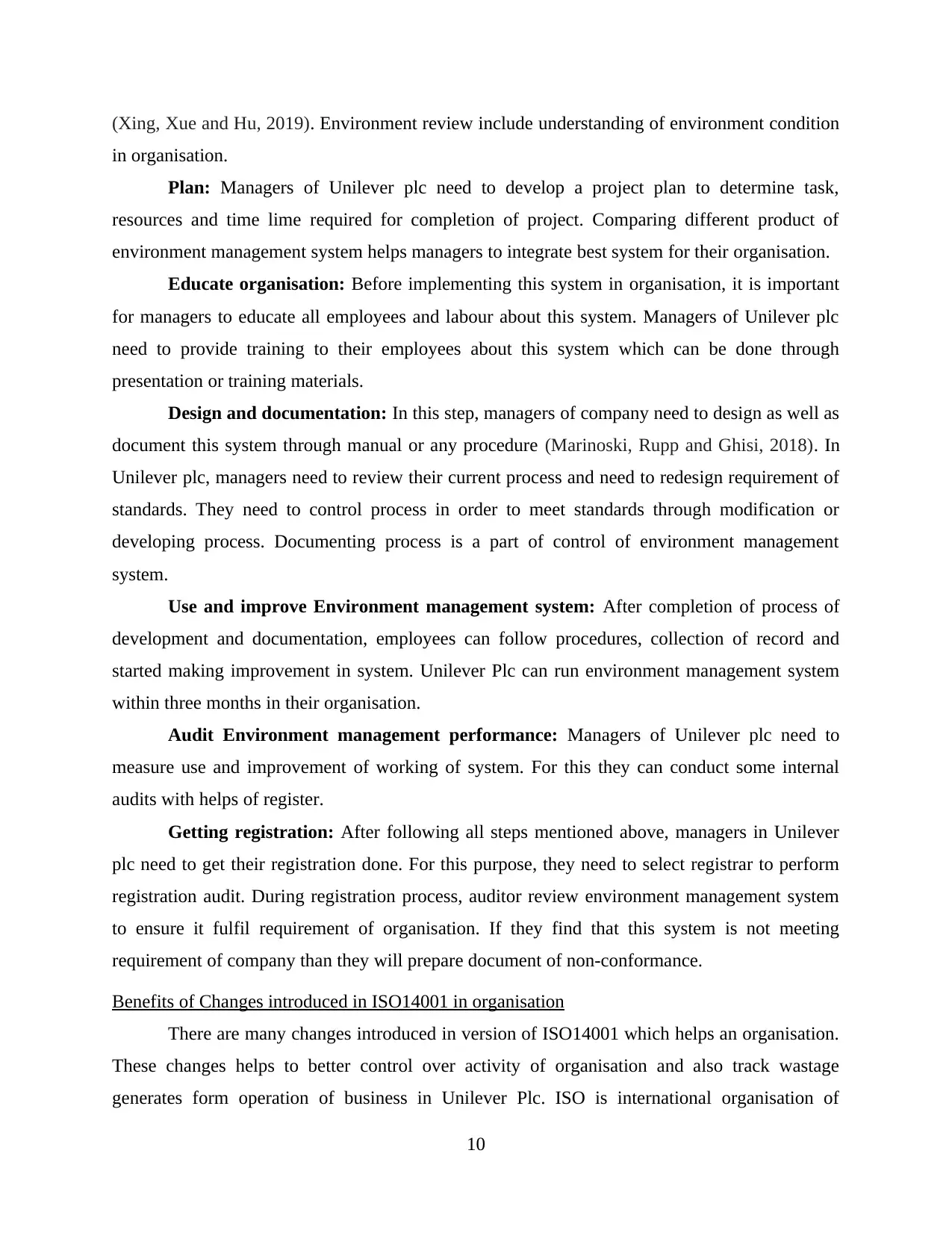
(Xing, Xue and Hu, 2019). Environment review include understanding of environment condition
in organisation.
Plan: Managers of Unilever plc need to develop a project plan to determine task,
resources and time lime required for completion of project. Comparing different product of
environment management system helps managers to integrate best system for their organisation.
Educate organisation: Before implementing this system in organisation, it is important
for managers to educate all employees and labour about this system. Managers of Unilever plc
need to provide training to their employees about this system which can be done through
presentation or training materials.
Design and documentation: In this step, managers of company need to design as well as
document this system through manual or any procedure (Marinoski, Rupp and Ghisi, 2018). In
Unilever plc, managers need to review their current process and need to redesign requirement of
standards. They need to control process in order to meet standards through modification or
developing process. Documenting process is a part of control of environment management
system.
Use and improve Environment management system: After completion of process of
development and documentation, employees can follow procedures, collection of record and
started making improvement in system. Unilever Plc can run environment management system
within three months in their organisation.
Audit Environment management performance: Managers of Unilever plc need to
measure use and improvement of working of system. For this they can conduct some internal
audits with helps of register.
Getting registration: After following all steps mentioned above, managers in Unilever
plc need to get their registration done. For this purpose, they need to select registrar to perform
registration audit. During registration process, auditor review environment management system
to ensure it fulfil requirement of organisation. If they find that this system is not meeting
requirement of company than they will prepare document of non-conformance.
Benefits of Changes introduced in ISO14001 in organisation
There are many changes introduced in version of ISO14001 which helps an organisation.
These changes helps to better control over activity of organisation and also track wastage
generates form operation of business in Unilever Plc. ISO is international organisation of
10
in organisation.
Plan: Managers of Unilever plc need to develop a project plan to determine task,
resources and time lime required for completion of project. Comparing different product of
environment management system helps managers to integrate best system for their organisation.
Educate organisation: Before implementing this system in organisation, it is important
for managers to educate all employees and labour about this system. Managers of Unilever plc
need to provide training to their employees about this system which can be done through
presentation or training materials.
Design and documentation: In this step, managers of company need to design as well as
document this system through manual or any procedure (Marinoski, Rupp and Ghisi, 2018). In
Unilever plc, managers need to review their current process and need to redesign requirement of
standards. They need to control process in order to meet standards through modification or
developing process. Documenting process is a part of control of environment management
system.
Use and improve Environment management system: After completion of process of
development and documentation, employees can follow procedures, collection of record and
started making improvement in system. Unilever Plc can run environment management system
within three months in their organisation.
Audit Environment management performance: Managers of Unilever plc need to
measure use and improvement of working of system. For this they can conduct some internal
audits with helps of register.
Getting registration: After following all steps mentioned above, managers in Unilever
plc need to get their registration done. For this purpose, they need to select registrar to perform
registration audit. During registration process, auditor review environment management system
to ensure it fulfil requirement of organisation. If they find that this system is not meeting
requirement of company than they will prepare document of non-conformance.
Benefits of Changes introduced in ISO14001 in organisation
There are many changes introduced in version of ISO14001 which helps an organisation.
These changes helps to better control over activity of organisation and also track wastage
generates form operation of business in Unilever Plc. ISO is international organisation of
10
⊘ This is a preview!⊘
Do you want full access?
Subscribe today to unlock all pages.

Trusted by 1+ million students worldwide
1 out of 16
Related Documents
Your All-in-One AI-Powered Toolkit for Academic Success.
+13062052269
info@desklib.com
Available 24*7 on WhatsApp / Email
![[object Object]](/_next/static/media/star-bottom.7253800d.svg)
Unlock your academic potential
Copyright © 2020–2026 A2Z Services. All Rights Reserved. Developed and managed by ZUCOL.




